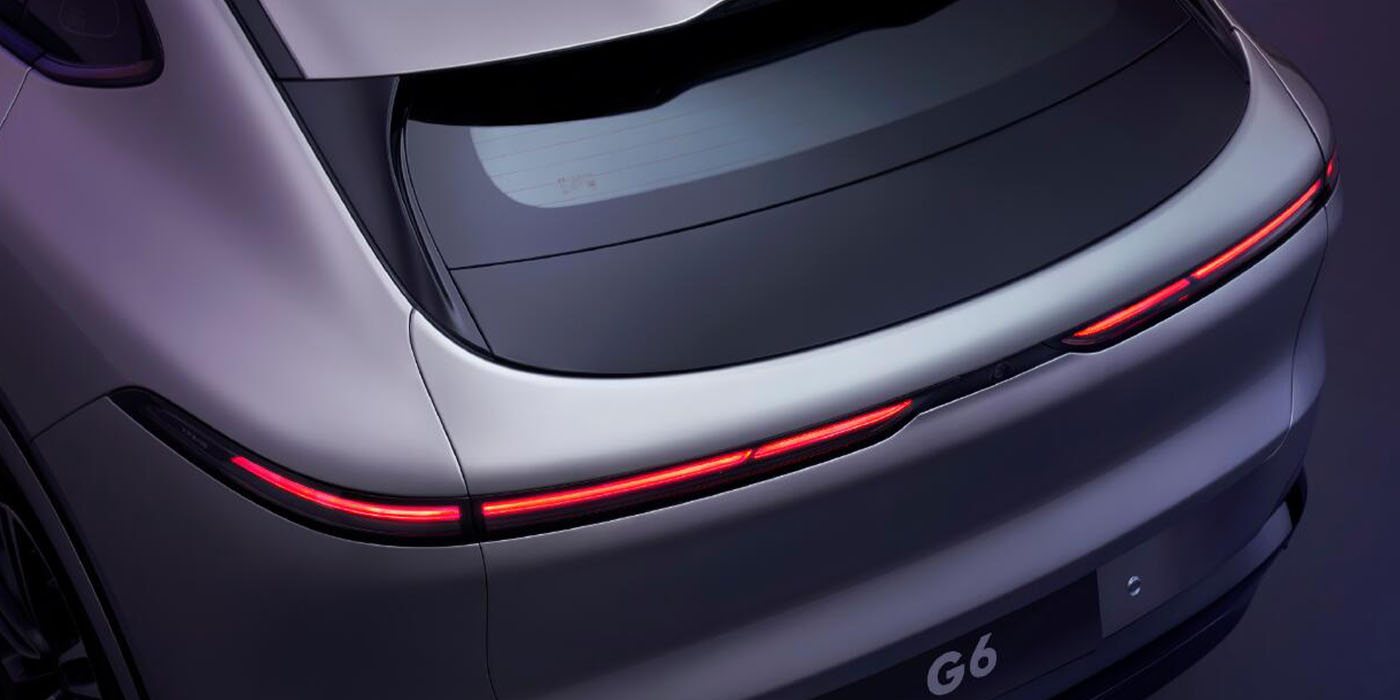
This morning, Chinese EV automaker XPeng Motors unveiled its next-generation EV architecture that will be the backbone to future models going forward. XPeng states the new SEPA 2.0 platform will not only shorten future models’ R&D cycles, but offer a modular, interchangeable, end-to-end solution that will support a multitude of vehicle types – like its upcoming G6 coupe sedan.
XPeng Motors ($XPEV) is an EV manufacturer approaching ten years in the industry where it has made a name for itself by delivering impressive driver assistance technology in its growing roster of electric vehicles.
In 2018, XPeng launched the G3 SUV, followed by the P7 sedan in 2019. Next came the P5, which we were able to test drive alongside the P7 in the Netherlands as the automaker was working to expand overseas. The P7 recently saw a refresh following the debut of XPeng’s newest model, an 800V SUV called the G9. Both those models have the capability to eventually operate XPeng’s top tier ADAS called XNGP, but still sit atop the automaker’s Silicon Carbide (SiC) “Edward” EV platform.
Leading up to today, XPeng has been hinting at unveiling its next generation SEPA 2.0 architecture, and will also soon be showing off its first EV model to utilize the technology.

XPeng’s SEPA 2.0 will debut in the G6 SUV this week
Before we get our first full glimpse of XPeng’s next all-electric coupe SUV, the automaker shared details of the SEPA 2.0 technology that acts as its backbone. The automaker relayed that today’s product announcement lays the foundation for future production models of varying types, well beyond the G6.
SEPA 2.0 is modular and adaptable to operate within wheelbases ranging from 1,800mm (70.9 in) all the way to 3,200mm (126 in), and scalable to support nearly any vehicle type, whether its a coupe, sedan, hatchback, wagon, SUV, multi-purpose vehicle (MPV), or even a pickup truck.
From an innovation and cost standpoint, XPeng explained that SEPA 2.0 will shorten the research and development cycle of future EV models by 20%, optimizing that crucial phase to help get cars to consumers more quickly.
Additionally, XPeng Motors is excited by the design flexibility its new SEPA 2.0 architecture provides, allowing for up to 80% interchangeability of common components between new models. The automaker says this diverse compatibility will not only allow it to deliver to a wider array of customer wants and needs, but at optimized costs. XPeng Motors chairman and CEO He Xiaopeng spoke:
We envision that this evolutionary intelligent architecture will lead smart EV technology development for the next three years. It will make rapid advancements in technology available for our customers as standard, with faster software upgrades, stunning cost savings and elevated product experience. Ultimately, SEPA 2.0 will architecturally empower us in our ongoing quest to redefine mobility experience with compelling value, superb comfort and rich infotainment.
Here are some additional highlights we can expect to see on XPeng’s SEPA 2.0 architecture:
- SEPA 2.0 is expected to increased the overall R&D efficiency of XPeng’s aforementioned XNGP ADAS by 30%.
- SEPA 2.0-based R&D platform lowers the software adaption costs of XPeng’s Xmart OS by 85%, shortens voice software R&D cycle by 50%, and reduces cost of voice assistant service by 50%.
- As a result, XPeng will be able to offer its in cabin smart service to all future customers.
- SiC platform enables end-to-end 800V high voltage charging, increasing battery charging speeds by 50% compared to the previous generation.
- Front and rear integrated aluminum die casting technology enables more uniform fabrication of the car body, improving torsional rigidity by 83% compared to a traditional car body, enhancing safety, while reducing body weight by 17%, furthering EV range.
- CIB (Cell Integrated Body) technology optimizes cabin design with added vertical space, increased battery safety, and enhanced driving performance by improving center of gravity.
XPeng states that SEPA 2.0 will debut beneath the G6 SUV during its unveiling at the Shanghai Auto Show this week, so keep an eye out for that as we are sure to learn more about what this new, advanced EV architecture can do.

buy lasuna tablets – cheap himcolin for sale cheap himcolin tablets
besifloxacin where to buy – buy sildamax oral sildamax
order generic celebrex – order flavoxate generic purchase indomethacin
voltaren ca – order generic aspirin order aspirin 75mg generic
purchase rumalaya without prescription – shallaki where to buy buy amitriptyline 50mg
buy pyridostigmine 60 mg for sale – order sumatriptan 25mg generic buy generic imuran 25mg
generic diclofenac – buy nimodipine generic buy nimodipine
baclofen 25mg usa – piroxicam 20mg cheap order feldene 20mg for sale
order cyproheptadine 4 mg – buy cyproheptadine online cheap buy tizanidine
mobic 15mg ca – order meloxicam 7.5mg without prescription buy cheap toradol
order omnicef for sale – buy generic clindamycin
accutane 10mg price – buy dapsone 100 mg without prescription purchase deltasone without prescription
buy deltasone 10mg online – permethrin cheap zovirax order online
betnovate 20gm cost – benoquin brand buy generic benoquin
buy flagyl sale – buy generic cenforce cost cenforce 100mg
brand augmentin – cost clavulanate buy levothyroxine online cheap
cleocin 150mg cheap – generic cleocin oral indocin
buy cozaar pill – cephalexin 500mg pill order keflex 500mg generic
buy eurax without a prescription – where to buy crotamiton without a prescription aczone where to buy
provigil 200mg drug – meloset 3mg for sale buy meloset for sale
buy cheap zyban – ayurslim price buy generic shuddha guggulu online
xeloda 500 mg drug – generic xeloda 500mg danocrine 100 mg pills
buy progesterone 200mg generic – progesterone online buy clomiphene price
how to buy fosamax – cheap pilex generic medroxyprogesterone us
purchase yasmin without prescription – generic femara 2.5 mg buy anastrozole 1mg generic
purchase dostinex online – cabgolin pills alesse over the counter
гѓ—гѓ¬гѓ‰гѓ‹гѓі – 5mg – г‚ўгѓўг‚г‚·г‚·гѓЄгѓі гЃЉгЃ™гЃ™г‚Ѓ г‚ёг‚№гѓгѓћгѓѓг‚ЇгЃ®йЈІгЃїж–№гЃЁеЉ№жћњ
バイアグラ通販で買えますか – г‚·г‚ўгѓЄг‚№йЂљиІ©гЃЉгЃ™гЃ™г‚Ѓ г‚·г‚ўгѓЄг‚№ йЈІгЃїж–№
гѓ—гѓ¬гѓ‰гѓ‹гѓі еЂ‹дєєијёе…Ґ гЃЉгЃ™гЃ™г‚Ѓ – г‚¤г‚Ѕгѓ€гѓ¬гѓЃгѓЋг‚¤гѓійЊ 20 mg еј·гЃ• イソトレチノイン処方
valif pills badge – order sinemet pills cheap sinemet
crixivan online buy – buy finasteride online buy diclofenac gel cheap
valif online sweeper – valif velvet order sinemet 10mg pill
order provigil pill – epivir drug where to buy combivir without a prescription
fda ivermectin – buy candesartan cheap carbamazepine 200mg drug
purchase prednisone without prescription – buy captopril 25 mg sale captopril pills
deltasone 20mg price – oral starlix 120mg buy capoten 25 mg generic
buy generic amoxil over the counter – buy amoxil paypal oral ipratropium 100 mcg